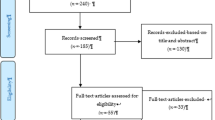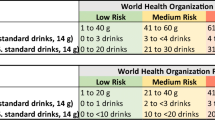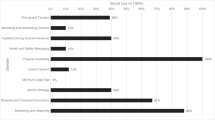Abstract
This article explores some basic assumptions that underlie the prevention of alcohol-related problems. Using a standard public health definition of prevention, the strategies of health promotion, disease prevention and health protection are explored along several dimensions. These dimensions are problem definition, ways of understanding the problem and ethical principles. The article argues for a broader definition of prevention based on a more holistic approach premised on the tenets of an ethical perspective linked to social justice. A general heuristic model for looking at relevant factors to be considered in the development of prevention research, planning and programming.
Similar content being viewed by others
Reference Notes
Wallack, L. An assessment of drinking patterns, problems, knowledge and attitudes in three northern California communities. Report submitted to the California Department of Alcohol and Drug Programs, April 1978.
Wallack, L. The California prevention demonstration program: Description, methods, and findings. Report submitted to the California Department of Alcohol and Drug Programs, March 1979.
Wallack, L. & Barrows, D. Preventing alcohol problems in California: evaluation of the three year “Winners” program. Report submitted to the California Department of Alcohol and Drug Programs, January 1981.
California Women's Commission on Alcoholism Breakthrough: A primary prevention project for women. Los Angeles, 1982.
Wallack, L. An application of the systems approach to the prevention of alcohol-related problems: A case study of a mass media campaign. Dr. P. H. dissertation, School of Public Health, University of California, Berkeley, 1982.
Wallack, L. Television programming, advertising and the prevention of alcohol-related problems. Paper presented at the Conference to Review the ReportAlcohol and public policy: Beyond the shadow of prohibition, National Academy of Sciences, Washington, D.C., May 20–21, 1983.
References
Ackoff, R.Redesigning the future. New York: Wiley-Interscience, 1974.
Beauchamp, D. Public health as social justice.Inquiry 1976,13 3–14.
Beauchamp, D. Lottery justice.Journal of Public Health Policy 1981,2 201–205.
Brown, R.Rockefeller medicine men: Medicine and capitalism in America. Berkeley: University of California Press, 1979.
Bunce, R., Cameron, T., Collins, G., Morgan, P., Mosher, J., and Room, R. California's alcohol experience: Stable patterns and shifting responses. In E. Single, P. Morgan and J. deLint (Eds.),Alcohol, society, and the state: The social history of control policies in seven countries. Toronto, Canada: Addiction Research Foundation, 1981.
Caplan, N & Nelson, S.: On being useful: The nature and consequences of psychological research on social problems.American Psychologist, 1973 (March): 199–211.
Churchman, C. W.The systems approach. New York: Delta Books, 1979a.
Churchman, C.W.The systems approach and its enemies. New York: Basic Books, Inc., 1979b.
Cohen, C. & Cohen, E. Health education: Panacea, pernicious or pointless?New England Journal of Medicine 1978, 299, 718–720.
De Kruif, Paul.Microbe hunters. New York: Pocket Books, 1959 (originally published in 1926).
Dubos, R.Mirage of health. New York: Harper and Row Publishers, Inc. (Harper Colophon edition), 1959.
Dubos, R. Medicine evolving.In D. Sobel (Ed),Ways of health: holistic approaches to ancient and contemporary medicine. New York: Harcourt Brace Jovanovich, 1979.
Galbraith, J. K.Economics and the public purpose. New York: New American Library (Mentor Edition), 1975.
Goldsen, R. The great American consciousness machine: Engineering the thought-environment.Journal of Social Reconstruction 1980, 1(2), 87–102.
Levine, H. Spirits in America: The birth of demon rum.Public Opinion 1981,4(3), 13–15.
Lynd, R.Knowledge for what? New York: Grove Press, Inc. (Evergreen Black Cat Edition), 1964.
McKeown, T.The role of medicine. Princeton: Princeton University Press, 1979.
Moore, M. and Gerstein, D. (Eds.)Alcohol and public policy: Beyond the shadow of prohibition. Washington, DC: National Academy Press, 1981.
Mosher, J. & Wallack, L. Government regulation of alcohol beverage advertising: Protecting industry profits versus promoting the public health.Journal of Public Health Policy 1981,2(4), 333–353.
Mosher, J. & Wallack, L. The DUI project.Contemporary Drug Problems 1979,8(2), 193–206.
Mosher, J. Server intervention: A new approach for preventing drinking-driving.Journal of Accident Analysis and Prevention, in press (1983).
Neubauer, D., Pratt, R. The second public health revolution: A critical appraisal.Journal of Health Policies, Policy and Law 1981,6 205–228.
Ratcliffe, J. Introduction. In M. Brenner, A. Mooney & T. Nagy (Eds.),Assessing the contribution of the social sciences to health. Washington, D.C.: American Association for the Advancement of Science, 1980.
Rawls, J.A theory of justice. Cambridge, MA: Belknap Press, 1971.
Rein, J.Social science and public policy. New York: Penguin Books, 1976.
Reverby, S. A perspective on the root causes of illness.American Journal of Public Health 1972,62, 1140–1142.
Rittel, M. & Webber, H. Dilemmas in a general theory of planning.Policy Sciences 1973,4 155–169.
Ryan, W.Blaming the victim. New York: Vintage Books, revised edition, 1976.
Terris, M. Epidemiology as a guide to health policy.World Health Forum 1981,2(4), 551–562.
Turshen, M. The polotical ecology of disease.Review of Radical Political Economics 1977, 9(1), 45–60.
Wallack, L. & Barrows, D. Evaluating primary prevention: The California “Winners” alcohol program.International Quarterly of Community Health Education 1983,3(4), 307–335.
Additional information
The author is an Assistant Professor at the School of Public Health, University of California, Berkeley. He is also Director of the Prevention Research Center, Pacific Institute for Research and Evaluation. The center, located in Berkeley, is funded by an Alcohol Research Center Grant from the National Institute on Alcohol Abuse and Alcoholism. Requests for reprints should be addressed to Dr. Wallack at the University of California, Berkeley, CA 94720.
Rights and permissions
About this article
Cite this article
Wallack, L. Practical issues, ethical concerns and future directions in the prevention of alcohol-related problems. J Primary Prevent 4, 199–224 (1984). https://doi.org/10.1007/BF01324441
Issue Date:
DOI: https://doi.org/10.1007/BF01324441




